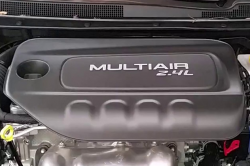— A Tigershark engine lawsuit alleges Chrysler equipped multiple models with defective 2.4L Tigershark MultiAir 4-cylinder engines that burn excessive amounts of oil.
The Tigershark engine lawsuit was filed for all consumers in Michigan who bought or leased any of these vehicles.
- 2014-2020 Jeep Cherokee
- 2015-2020 Jeep Renegade
- 2017-2020 Jeep Compass
- 2013-2016 Dodge Dart
- 2015-2020 Ram ProMaster City
- 2015-2016 Chrysler 200
- 2016-2020 Fiat 500X
According to the class action lawsuit, the Tigershark engines have caused customers to pay for constant quarts of oil to replace the extreme amounts of oil consumed from everyday driving.
Owners allegedly have lost time, money and vehicle values because of the 2.4-liter engines, all while facing the dangers of vehicles that stall without warning.
Owners complain about vehicles that stall when making turns or accelerating and decelerating, creating serious safety hazards and making the vehicles inoperable.
According to plaintiff Caren Christman, she leased a new 2018 Jeep Compass in August 2018, but with less than 5,000 miles on the vehicle, the Tigershark engine allegedly stalled due to low engine oil.
The dealership added oil, but a few months later in January 2019, the Tigershark engine allegedly stalled again while she was driving. She took the Jeep to the dealer and the technician said the oil was low and told the plaintiff to return every 1,000 miles for three times to conduct an oil consumption test.
On March 7, 2019, she returned for an oil level check and the dealership allegedly informed her that “normal” oil consumption for her vehicle was one quart for every 1,000 miles up to 50,000 miles, and one quart for every 750 miles above 50,000 miles.
On April 3, when she returned for another oil level check and the dealership said the oil was low and the vehicle had burned off one quart of oil per 1,000 miles.
The plaintiff allegedly returned to the dealership twice in or around May and June 2019 for additional oil consumption tests, but the Tigershark engine allegedly stalled again due to low oil. This time the dealer changed the oil, but four months later the Tigershark allegedly stalled again due to low oil and again the oil was changed.
More oil consumption tests were conducted and technicians determined the Jeep was consuming one quart of oil every 1,000 miles. The plaintiff was allegedly told "this problem is common in these vehicles and the only fix would be an engine replacement that FCA would have to approve. To date, FCA has not done so."
The Tigershark engine lawsuit claims Fiat Chrysler (FCA US) is aware of the oil consumption problems but refuses to provide adequate repairs. The plaintiff further claims repairs under warranty are a waste of time because the vehicles continue to stall, with some owners saying the Tigershark engines had to be replaced.
Chrysler has allegedly known about the oil consumption problems since at least 2013 but simply tells customers it's acceptable for the vehicles to burn a quart for every 1,000 miles and advising them to add additional oil between oil changes.
The Tigershark engine lawsuit says in rare cases Chrysler will replace the engine, but the replacement engine is just as defective as the original.
The Tigershark engine lawsuit was filed in the U.S. District Court for the Eastern District of Michigan, Southern Division: Christman, et al., v. FCA US LLC.
The plaintiff is represented by Mantese Honigman, PC, Chimicles Schwartz Kriner & Donaldson-Smith LLP, Capstone Law APC, and Berger Montague PC.
CarComplaints.com has complaints from drivers about the vehicles listed in the Tigershark engine lawsuit.

